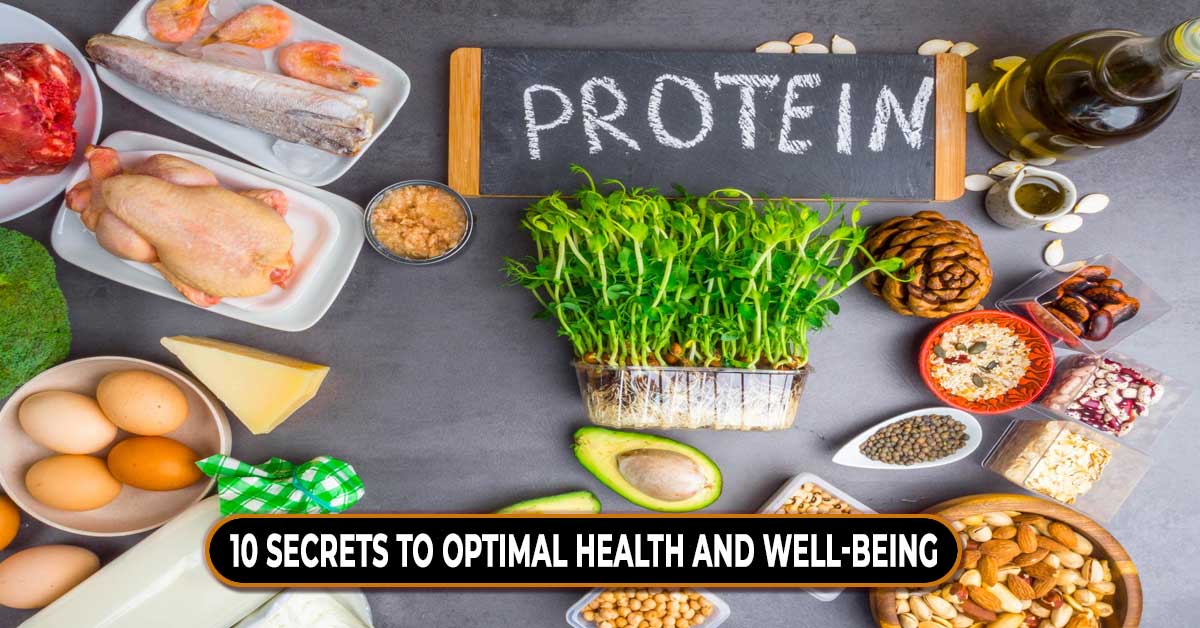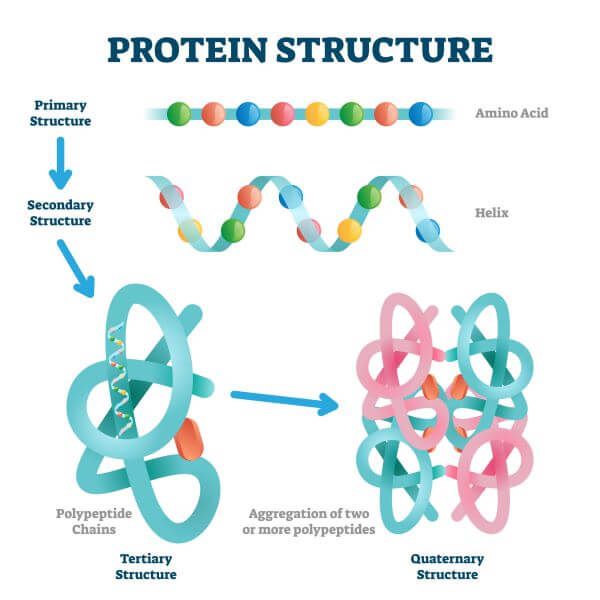In a world where health and well-being are prized more than ever, the search for the secret to a vibrant life often leads us to the humble nutrient: Protein. A healthy lifestyle often involves incorporating an adequate amount of protein rich foods into your diet to support various bodily functions, muscle health, and overall well-being.
Whether you’re a fitness enthusiast, a young professional striving for a balanced lifestyle, or simply curious about optimizing your nutrition, this article is your gateway to understanding the transformative power of protein. Unveiling the 10 secrets to optimal health and well-being, we’ll explore the importance of protein rich foods, its diverse forms, and the myriad benefits it bestows. Welcome to a journey where protein becomes the cornerstone of your wellness story. Protein is essential, not just for athletes but for everyone, as it builds, repairs, and energizes your body. Discover why you absolutely need it in this comprehensive guide.
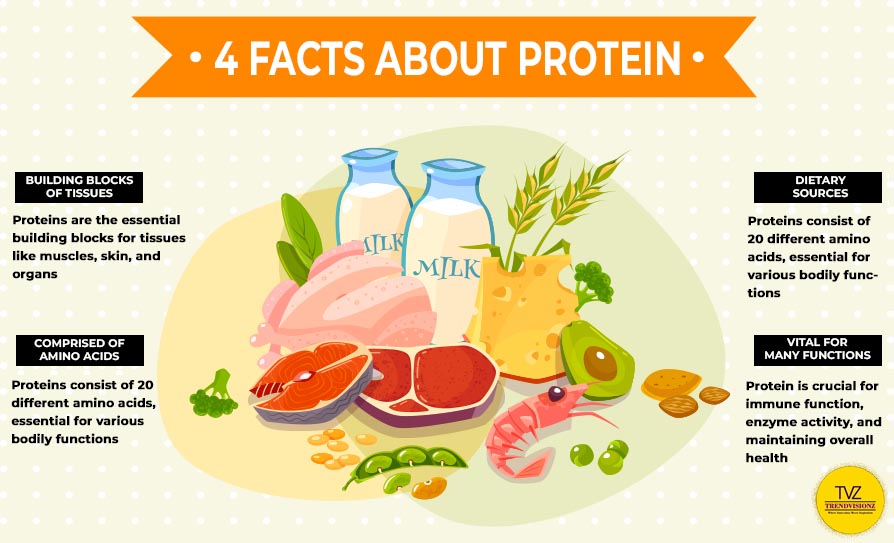
Also Read :
- 10 Fashion Designers in India 2023 – Indian Fashion Trends
- The Future of Travel: Embracing Sustainability for a Better Planet
- Benefits of Tea: Creating Tranquility in a Busy World
What Is Protein and Why Does Your Body Need It
Let’s start with the protein definition: Protein is essential for your body to function correctly and is often the cornerstone of a healthy lifestyle. It comprises building blocks known as amino acids, vital for repairing and regenerating cells.
Your body relies on a steady supply of protein to maintain robust muscles, bones, flexible cartilage, circulating blood, and healthy skin. Beyond physical well-being, protein is crucial in fueling your body, helping you feel full, and contributing to overall vitality. This nutrient’s significance is particularly prominent in growth and development, making it essential for children, teenagers, and pregnant women.
Most people get enough protein, but if you’re very active or trying to lose weight, you may need more. The typical recommendation is 0.5 to 0.9 grams of protein per kg of your body weight, so if you weigh 150 kg, aim for 75 to 135 grams of protein each day.
Good sources: List of protein rich foods
Discover good sources of protein for a high-protein diet. From lean meats to plant-based options, these protein-rich foods are essential for a nutritious and balanced diet.
- Meat (chicken, beef, pork)
- Fish and seafood (salmon, tuna, shrimp)
- Eggs
- Dairy (Greek yogurt, milk)
- Nuts and seeds
- Beans and lentils
By embracing food with protein in your daily diet, you’re actively nurturing a healthy lifestyle and providing your body with the nourishment it craves.
Protein Structures
Protein is composed of building units known as amino acids. Twenty different amino acids join together in various combinations to form all the proteins in nature. The protein structures is a hierarchical arrangement: primary (amino acid sequence), secondary (localized folding), and tertiary (complete 3D conformation) structures critical for protein function.
Essential Amino Acids
Nine of these amino acids are considered “essential” because your body can’t produce them independently—you have to get them from the foods you eat. The essential amino acids include:
- Leucine: Important for muscle protein synthesis. Found in foods like beef, chicken, fish, eggs, and dairy.
- Isoleucine: Important for immune function, hemoglobin production, and blood sugar regulation. Found in the same foods as leucine.
- Valine: Important for muscle metabolism, tissue repair, and energy production. It is also found in the same high-protein foods.
Getting all the essential amino acids in the proper amounts is vital to maintaining Optimal health and optimizing muscle gain or fat loss. Most animal sources of protein rich foods like meat, fish, eggs, and dairy contain all the essential amino acids. Some plant-based proteins are also complete, such as quinoa.
By eating a variety of healthy protein sources each day, you’ll ensure you get the full spectrum of essential amino acids your body requires to operate at its best.

Types of Protein: Complete vs Incomplete
Proteins are classified into two types: complete and incomplete. Complete proteins contain all nine essential amino acids our body needs. In contrast, incomplete proteins lack one or more of these amino acids.
Complete Proteins
Complete proteins provide all the amino acids our body can’t produce on its own in the proper proportions. Some plant-based complete proteins include quinoa, buckwheat, and soy. Consuming a variety of complete proteins with most meals is an easy way to ensure you get all the amino acids your body needs to function correctly. Some examples of complete protein rich foods are:
- Eggs
- Quinoa
- Chicken
- Fish
Incomplete Proteins
Incomplete proteins are those that lack one or more critical amino acids. They are in most plant-based foods like beans, nuts, and grains. While these foods are still healthy, you must eat various of them to get all the amino acids you need. Some examples of incomplete proteins include:
- Beans and rice
- Hummus and pita
- Peanut butter on whole wheat bread
By consuming both complete and incomplete proteins in your diet regularly, you can get all the amino acids your body requires to build and repair muscle, enzymes, and hormones. The key is eating a balanced diet with various high-quality, lean proteins at each meal.
Benefits of Consuming Enough Protein Rich Foods Daily
Have you ever thought about what are the benefits of protein, beyond just muscle growth? Consuming enough foods high in protein daily is essential for overall well-being.
- Weight Management: Including protein rich foods with each meal, especially breakfast, can help you feel full and reduce cravings. This, in turn, aids in weight management and maintenance. Protein also gives your metabolism a slight boost, helping you burn a few more calories after eating.
- Muscle, Bone, and Joint Health: Adequate protein intake is vital for the health of your muscles, bones, and joints. It helps prevent the loss of muscle mass and strength as you age, and it plays a crucial role in building and repairing bone, joint, and connective tissues like tendons and ligaments.
- Blood Sugar Regulation: Consuming protein with every meal helps maintain healthy blood sugar levels, preventing energy crashes. It gives your body a steady supply of amino acids to produce neurotransmitters that regulate mood and motivation.
- Immune Support and Healing: Protein is essential for a healthy immune system and wound healing. It aids in antibody production and the health of cells lining your digestive and respiratory tracts. Moreover, protein is crucial in forming new skin, blood cells, and tissues to repair injury damage.
By prioritizing your daily protein intake and including it in every meal, you’re not just nourishing your muscles but also benefiting your entire body. It’s the key to a healthier, more energetic you. A well-rounded diet with protein-rich foods is your ticket to unlocking these numerous health advantages.Incorporate best sources of protein in daily diet.
Also Read:
- The Future of Coworking: 10 Trends That Will Shape 2024
- Miracle Multiples: Complete Resource for Healthy Twins and Triplets
Top Sources of Protein Rich Foods to Meet Your Needs
Protein is an essential nutrient that is pivotal in maintaining a healthy body. Meeting your daily protein requirements is necessary not only for muscle growth but also for overall well-being. Whether you’re a Non-Vegetarian, vegetarian, or vegan, there are numerous protein-rich options.
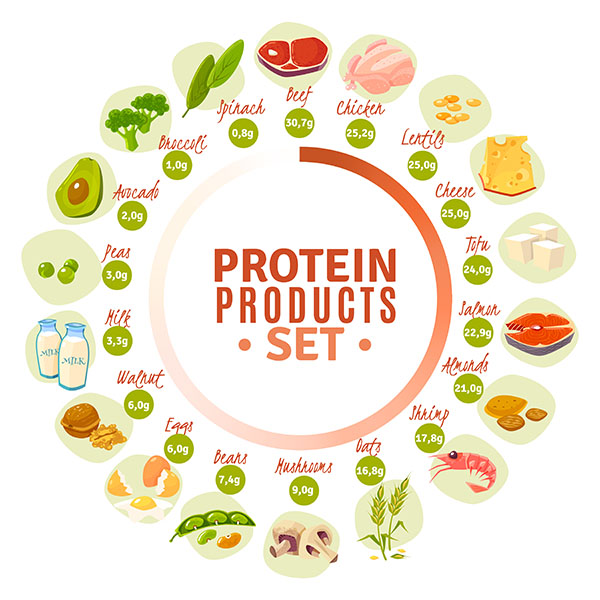
Top 10 Protein Foods List
In this list of top 10 protein foods, we’ll explore their nutritional content and how they can benefit your health.
1. Lean Meats (e.g., chicken):
A 3-ounce serving provides about 26 grams. Lean chicken is a versatile and low-fat source of protein, making it a favorite for many.
2. Fish (e.g., Salmon):
A 3-ounce serving offers around 22 grams. Salmon is not only a great source of protein but also provides heart-healthy omega-3 fatty acids.
3. Legumes (e.g., Lentils):
About 8 grams per half cup. Lentils are a fantastic plant-based source of protein, rich in fiber and essential nutrients. They are an excellent protein-rich food for vegetarians
4. Dairy Products (e.g., Greek Yogurt):
1 cup of Greek yogurt contains approximately 23 grams. Greek yogurt is also a good source of calcium and has probiotics for gut health.
5. Eggs:
A single large egg has about 6 grams. Eggs are protein-packed but also versatile and easy to include in your meals.

6. Nuts (e.g., Almonds):
An ounce of almonds provides around 6 grams. Almonds are a convenient and nutrient-rich snack option.
7. Mushroom:
A 100-gram serving of mushrooms provides a wealth of essential nutrients, making them a valuable addition to your diet.
8. Tofu:
Half a cup of tofu contains approximately 20 grams. Tofu is rich in iron and calcium, contributing to overall health.
9. Quinoa:
Approximately 8 grams per cup (cooked). Quinoa is also a good source of fiber and iron, making it a complete plant-based protein.
10. Ragi (Finger Millet):
Offering 13 grams of protein per 100-gram serving, ragi is a nutritious whole grain that provides a substantial plant-based protein source along with essential nutrients.
Choose lean, high protein, low carb foods and aim for 20 to 30 grams of protein with each meal for most adults. Your individual needs may vary, so talk to your doctor or a dietitian for your specific recommendations.
How Much Protein You Need Each Day (As Per Age)
As you age, your daily protein needs change, and they can vary based on age, gender, and specific age groups. How much you require depends on your weight, health conditions, and activity level. Here are some general guidelines.
| Gender | Age Group | Protein Requirement (grams per day) | Dietary Tips |
| Male | Teenagers (14-18) | 70 to 126 | Focus on lean proteins like fish, eggs, nuts, and legumes. |
| Adults (19-50) | 80 to 144 | Choose a variety of protein sources, including poultry, seafood, dairy, and plant-based options. Staying active may require the higher end of the range. | |
| Older Adults (51+) | 90 to 144 | To maintain muscle health, focus on high-quality, easy-to-digest proteins | |
| Female | Teenagers (14-18) | 70 to 126 | Focus on lean proteins like fish, eggs, nuts, and legumes. |
| Adults (19-50) | 65 to 118 | Choose a variety of protein sources, including poultry, seafood, dairy, and plant-based options. Staying active may require the higher end of the range. | |
| Older Adults (51+) | 65 to 118 | To maintain muscle health, focus on high-quality, easy-to-digest proteins. |
These recommendations are generalized, and individual protein requirements may vary. It’s advisable to consult with a healthcare provider or registered dietitian for personalized guidance based on your specific needs. The key is to eat a balanced diet with lean proteins and stay physically active to support muscle health at every stage of life.
Protein and Pregnancy: Nourishing Your Baby’s Growth
Ensuring food rich in protein for pregnancy is vital. Optimal sources include lean meat, poultry, seafood, and eggs, providing essential nutrients for the baby’s development. Additionally, plant-based options like beans, peas, nuts, seeds, and soy products contribute to a well-rounded protein intake for expecting mothers.
How Much Protein to Build Muscle
You’ve probably often wondered, “How much protein should I eat in a day?” The key to fueling your muscle-building journey is to consume the correct amount of protein rich foods. We’ll explore the recommended daily protein intake based on body weight and exercise intensity. Understanding protein’s role in muscle building is crucial for your fitness goals.
Protein and Exercise
In our exploration of the significance of exercise, particularly in our 15-minute home workout guide, it’s evident that regular physical activity not only contributes to your overall fitness but also places an increased demand on your body for protein.
How much protein to build muscle per day: approximately 1.6 to 2.2 grams of protein per kilogram of body weight per day. If you are involved in highly intensive workout sessions, For instance, weighing 70 kg, your target would be 75 to 135 grams of protein. Distribute this intake evenly throughout the day, ensuring each meal is rich in protein containing approximately 20 to 30 grams of protein.
Protein Calculator
To make it easier, you can use a protein calculator that helps you determine your precise protein needs based on your individual factors. Calculate your optimal protein intake to support muscle growth and answer the question, “How much protein should I eat in a day?”
Protein Intake Calculator
Protein Intake Recommendations:
American Dietetic Association (ADA): At least 60 – 108 grams/day.
The Centers for Disease Control and Prevention (CDC): 54 – 188 grams/day (10-35% of daily caloric intake).
World Health Organization safe lower limit: 50 grams/day.
Your recommended daily protein intake is: grams/day
Importance of Protein Rich Foods in Muscle Building
Protein plays a vital role in muscle development. It contains the essential amino acids required for muscle repair and growth. Consuming adequate protein at each meal, especially during breakfast, has been shown to promote muscle growth and maintenance. However, it’s important to strike a balance, as overdoing it with excessive protein intake can potentially strain your kidneys. Focus on lean, high-protein, low-carb foods, and you’ll be well on your way to building muscle.
Remember that muscle repair and growth primarily occur during rest, not while you’re working out. Therefore, providing your muscles with the essential fuel, especially after strength or resistance training, helps them rebuild stronger.
Weight Management with Protein
Achieving your weight goals involves strategic nutrition. Protein plays a crucial role in both weight loss and gain. Explore how this macro nutrient contributes to effective weight management.
- High protein foods for weight loss: Slim Down with Protein: Discover the role of protein in supporting weight loss. From boosting metabolism to reducing appetite, find out how it aids in shedding unwanted pounds.
- High protein meals to gain weight: For those seeking to bulk up, protein is a key player. Uncover the best high-protein meals to help you gain weight healthily and efficiently.
Japanese Protein Rich Foods for Longevity
Japanese cuisine is renowned for its variety of nutritious ingredients that promote health and longevity. The essence of the “Japanese Way of Life” lies in its extraordinary ability. Two foods stapled in the traditional Japanese diet for centuries are tofu and natto.
Tofu
Tofu, made from soybeans, is a complete plant-based protein source containing all nine essential amino acids. It’s cholesterol-free, low in calories, and saturated fat. Tofu can be prepared in various ways, absorbing flavors from spices and sauces.
Natto
Natto, derived from fermented soybeans, promotes gut health and digestion due to its probiotics. It’s rich in protein, fiber, and B vitamins and features nattokinase, which may lower blood pressure. While it has a unique taste, natto can be consumed with rice for breakfast or added to salads, stir-fries, and stews.
While tofu and natto may be lesser-known foods in Western diets, they have been prized in the Japanese diet for a long time. Adding these soy-based protein sources to your diet a few times a week may help you live a longer, healthier life.
Protein Shakes, Powders, and Supplements
Protein powders, shakes, and supplements are popular products today for boosting your daily protein intake. While whole foods should make up most of your protein consumption, supplements can be helpful in certain situations.
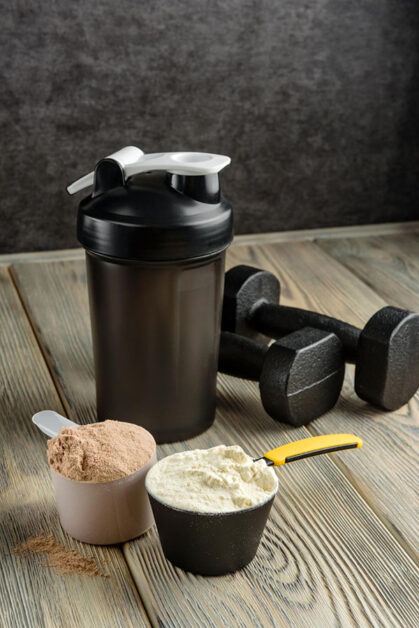
Protein Powders
Protein powders, like whey or plant-based powders, can be mixed into smoothies, oatmeal, yogurt, or juice. They provide an easy way to add extra protein to your diet. Look for a powder with at least 20-30 grams of protein per scoop and a few grams of sugar. The most common types are whey (from dairy), casein (from dairy), egg white, and plant-based (from rice, pea, hemp, etc.).
Protein Shakes
Pre-made protein shakes, especially whey-based shakes, can be a quick, on-the-go option. However, they are often loaded with sugar, artificial flavors, and preservatives. It’s best to choose a shake with minimal added sugar and high in protein. Or make your shake at home using milk, yogurt, or plant-based milk and your choice of protein powder and nuts for added protein intake.
Protein Supplements
Supplements like protein bars, ready-to-drink protein beverages, cookies, or pasta can also help boost your protein intake. But they frequently contain many calories, sugar, saturated fat, and artificial ingredients. So, consume these in moderation and choose the most nutritious options whenever possible. For the best results, get most of your protein from whole foods like meat, fish, eggs, dairy, nuts, and legumes. Use supplements only occasionally or to address specific needs.
Protein Deficiency Symptoms
A protein deficiency can manifest in various ways, impacting your health and well-being. If you’re not getting enough protein in your diet, you may experience some symptoms like:
- Fatigue and Muscle Loss: Without adequate protein, your body can’t build and repair muscle properly. That can result in loss of strength and tiredness. You may feel exhausted even after little activity.
- Slow Recovery: Exercise causes little muscle tears, and protein helps repair them. If you’re protein deficient, your muscles won’t heal as quickly after a workout. Exercise recovery will take longer, and you won’t gain muscle as efficiently.
- Weakness: Your muscles and tissues need protein to function. A lack of protein can sap your strength and cause general feelings of weakness or lightheadedness.
- Irritability and Depressed Mood: Protein contains amino acids that produce neurotransmitters that regulate your mood and emotions. Low protein may lead to irritability, restlessness, and a depressed mood.
- Slow Wound Healing: Protein is essential for cell regeneration and the production of new connective tissue. Without enough protein, your body can’t heal wounds, cuts, or injuries as quickly. Minor damage to your skin or tissues may take longer to repair.
To ward off these symptoms, prioritize a diet balanced with protein rich foods and consider supplements if necessary for daily requirements.
Also Read:
- 5 Reasons How Shopping Malls Are Driving Economic Growth
- Why India Is the Perfect Host for the 2023 Cricket World Cup
FAQ:
Which are primary protein?
The primary protein encompasses amino acid sequence within the polypeptide chain. There are four types of protein structure: primary, secondary, tertiary, and quaternary.
How do vegetarians get protein?
Vegetarians obtain protein from plant-based sources like beans, lentils, tofu, and quinoa. Protein for vegetarians include combining various plant foods ensures they receive all essential amino acids for a well-rounded and nutritious diet
What are examples of food with high protein?
food with high protein include chicken breast, Greek yogurt, eggs, quinoa, and lentils. These delicious options are perfect for boosting protein intake and supporting muscle health
Conclusion
Now that you understand the importance of protein rich foods in your daily diet. Integrating a sufficient amount of protein into your daily diet is a key component of maintaining a healthy lifestyle.
Embrace a variety of high-quality sources like lean meats, fish, eggs, dairy, nuts, and legumes. Experiment with new recipes to keep your meals exciting. With the right protein intake, you’ll feel energized to tackle each day and lead a long, healthy, and active life.
Now you have a variety of protein foods list that ensures diverse sources of essential amino acids. Protein-rich foods are the key to your well-being!
Ready to supercharge your Career journey?
Let’s Grow Together
🔗 Connect with me on BizTech Chronicle to embark on this transformative quest! 🌐
Co-Founder: Trendvisionz – A Premier Digital Marketing Agency in India
🌐📈Navigating Tomorrow’s Tech Frontiers 🚀
Believe, transform, and succeed. Dive into insights, innovation, and industry trends that shape the digital landscape.
💼 Stay ahead in the fast-paced world of business technology. 💡📊
Bonus: Subscribe our Growing 1.95 Lakh+ YouTube Family
Subscribe for the Latest Tech Trends BizTechChronicle.
Join my LinkedIn Group: Digital Marketing, Content Creation World Group
Stay Informed. Connect with Trendvisionz Today! 💼🌐
